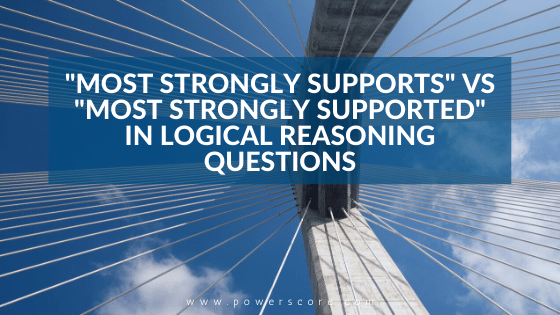Let’s look at two LSAT logical reasoning question stems that sound awfully alike, but are anything but:
“Which one of the following, if true, most strongly supports the argument above?”
vs.
“Which one of the following is most strongly supported by the information above?”
In the first instance, your job is to assume that each answer choice represents a true statement, and then determine which one is most helpful to validating the conclusion of the argument. This is a classic Strengthen question.
In the second example, your job is to determine which answer choice is most strongly supported by the information in the stimulus. This is basically an inference (or, as we call them, a “Must Be True”) question.
One caveat, however, should be noted when it comes to the particular phrasing of the Must Be True question. In a few instances, we have noticed that the phrase “most strongly supported” exacts a somewhat lower standard of scrutiny than the classic “which one of the following can be properly inferred…” stem. In other words, it is possible that the correct answer to that question is very strongly suggested or implied by the stimulus, but is not 100% provable by it.
Implications
This is particularly true in stimuli that describe correlations or coincidences that strongly imply a particular causal explanation. See, e.g. December 2007, Section 3, Question 10; September 2007, Section 1, Question 15; December 2000, Section 3, Question 13. In all three instances, the correct answer choice presents a reasonable explanation for the correlation described in the stimulus. As we know from our discussion of causal reasoning, however, such explanations are rarely provable 100%. They are, however, most strongly supported by the information contained in the stimulus.
Lessons Learned
There are two lessons to learn from this: First—read carefully and don’t generalize! The active vs. passive voice in the wording of the question stem makes a huge difference when it comes to the nature of the correct answer (Strengthen vs. Must Be True). Second, knowing the difference between the two is not enough. While being familiar with our method of approach to each question type is obviously essential, to get that top-1% score you need to go beyond that. Inject some flexibility into your application, and sometimes just go with your gut instinct.

